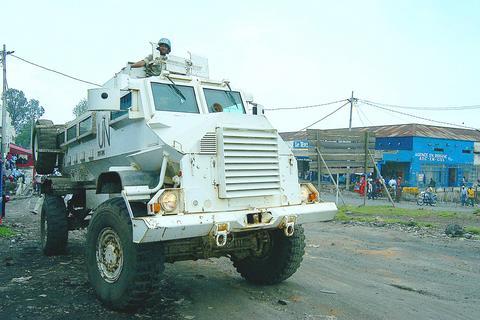The UN reported Thursday that thousands of civilians had fled a battle zone in the eastern Congo near the Rwanda border, heightening fears that the Congo war, which has claimed as many as 3 million lives, may be erupting once more.
But the Rwandan government, which played a crucial role in the hostilities that began in 1998 and, officially at least, ended early last year, rejected what UN observers called "corroborating clues" that its troops had entered eastern Congo, defying a recent international peace agreement.

PHOTO: EPA
The UN mission in Congo told news services that it had aerial photographs and ground sightings indicating that Rwandan troops had crossed the border into Congo. The evidence included encounters with soldiers who appeared to carry Rwandan military gear and the sighting of a group of about 100 soldiers who appeared to be of Rwandan origin.
UN officials also were quoted as saying that thousands of civilians had fled the area around Goma, in eastern Congo, amid fierce fighting between Rwandan rebels and an unidentified force.
Richard Sezibera, an adviser to Rwanda's president, Paul Kagame, said at a news conference on Thursday that reports of Rwandan troops entering Congo were false.
He added, however, that "if it became necessary in the defense of Rwandan territory, her sovereignty and her people and in pursuit of genocidal forces in the territory of the Democratic Republic of Congo, Rwanda would be forced to enter."
A Rwandan incursion would be a major setback for international efforts to resolve the conflict in Congo, which in the past year has drawn in the military forces of at least seven neighboring nations on both sides.
Twice before, in 1996 and 1998, Rwanda's Tutsi-led government has sent troops into Congo for the stated purpose of routing Hutu rebels, at least some of whom are former Rwandan soldiers who participated in the massacre of 800,000 Rwandan Tutsi and moderate Hutu in 1994.
The UN has mounted an effort with Congolese and Rwandan officials to disarm the Hutu rebels, but Rwandan officials say the disarmament effort has moved too slowly and that the rebels frequently have attacked Rwandan territory.
Some private analysts say, however, that Rwanda wants to promote instability in the region to increase its control of the area's rich natural resources, which include diamonds, gold and coltan, a crucial ingredient in cell phone circuit boards.
The UN has accused Rwanda, Uganda and Burundi of stealing vast quantities of coltan from Congo, which holds some 80 percent of the world's known reserves of the mineral.
Sezibera, the Rwandan president's adviser, dismissed those accusations as part of what he said was a smear campaign by Western analysts and Congolese officials against the Rwandan government.
On Thursday the EU's foreign-policy representative, Javier Solana, warned Rwandan officials that an invasion of eastern Congo would violate both international principles and a Nov. 20 agreement among 14 of the region's nations to work toward peace in the troubled region.

TIT-FOR-TAT: The arrest of Filipinos that Manila said were in China as part of a scholarship program follows the Philippines’ detention of at least a dozen Chinese The Philippines yesterday expressed alarm over the arrest of three Filipinos in China on suspicion of espionage, saying they were ordinary citizens and the arrests could be retaliation for Manila’s crackdown against alleged Chinese spies. Chinese authorities arrested the Filipinos and accused them of working for the Philippine National Security Council to gather classified information on its military, the state-run China Daily reported earlier this week, citing state security officials. It said the three had confessed to the crime. The National Security Council disputed Beijing’s accusations, saying the three were former recipients of a government scholarship program created under an agreement between the

Sitting around a wrestling ring, churchgoers roared as local hero Billy O’Keeffe body-slammed a fighter named Disciple. Beneath stained-glass windows, they whooped and cheered as burly, tattooed wresters tumbled into the aisle during a six-man tag-team battle. This is Wrestling Church, which brings blood, sweat and tears — mostly sweat — to St Peter’s Anglican church in the northern England town of Shipley. It is the creation of Gareth Thompson, a charismatic 37-year-old who said he was saved by pro wrestling and Jesus — and wants others to have the same experience. The outsized characters and scripted morality battles of pro wrestling fit

SUSPICION: Junta leader Min Aung Hlaing returned to protests after attending a summit at which he promised to hold ‘free and fair’ elections, which critics derided as a sham The death toll from a major earthquake in Myanmar has risen to more than 3,300, state media said yesterday, as the UN aid chief made a renewed call for the world to help the disaster-struck nation. The quake on Friday last week flattened buildings and destroyed infrastructure across the country, resulting in 3,354 deaths and 4,508 people injured, with 220 others missing, new figures published by state media showed. More than one week after the disaster, many people in the country are still without shelter, either forced to sleep outdoors because their homes were destroyed or wary of further collapses. A UN estimate

Australia’s opposition party yesterday withdrew election promises to prevent public servants from working from home and to slash more than one in five federal public-sector jobs. Opposition leader Peter Dutton announced his conservative Liberal Party had dropped its pledge that public servants would be required to work in their offices five days a week except in exceptional circumstances. “I think we made a mistake in relation to this policy,” Dutton told Nine Network television. “I think it’s important that we say that and recognize it, and our intention was to make sure that where taxpayers are working hard and their money is